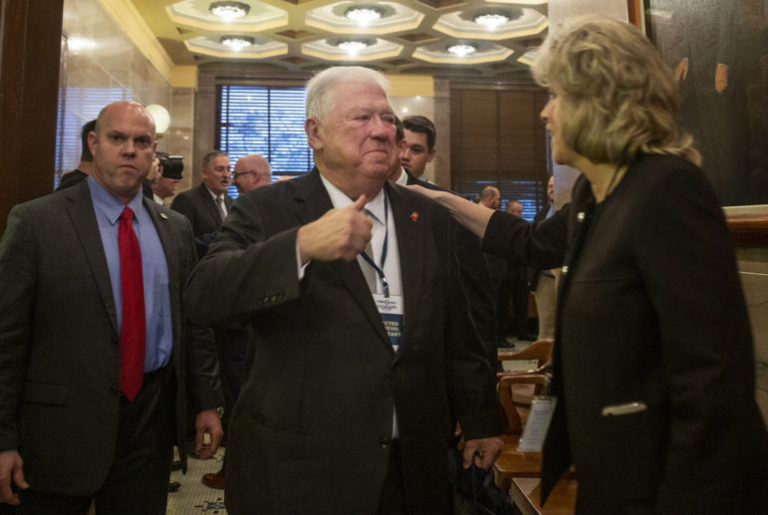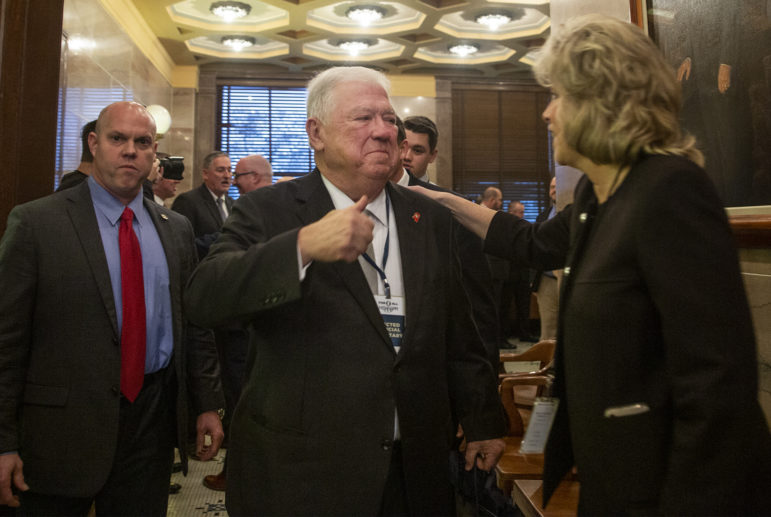

Eric J. Shelton/Mississippi Today, Report For America
Former Mississippi Gov. Haley Barbour attends Gov. Tate Reeves’ inauguration ceremony inside the House chamber at the Capitol in Jackson, Miss. Jackson, Miss., Tuesday, Jan. 14, 2020.
In 2006, the story goes then-Republican Gov. Haley Barbour was meeting with legislative staff about the extra federal funds the state received to respond to Hurricane Katrina that ravaged the Mississippi Gulf Coast when someone innocently proclaimed the Legislature will need to appropriate the funds.
Barbour, according to reports, said calmly in his deep, slow Southern drawl, that was not going to happen.
It did not. Such is the legend of Haley Barbour in the annals of the Mississippi Legislature.

Bobby Harrison
There were legislators, especially in the then Democratic-controlled House, who wanted the Legislature to have more oversight and more authority over the funds the state received in the aftermath of Katrina. They also wanted more control of the more than $1 billion in federal stimulus funds the state received to help plug budget holes caused by a dramatic drop in revenue after the Great Recession in 2008-09.
In each instance Barbour remained in firm control. And Phil Bryant, who followed Barbour, controlled most of the money the state received as a result of the 2010 BP oil spill in the Gulf of Mexico.
But now Republican Lt. Gov. Delbert Hosemann and House Speaker Philip Gunn are trying to take away the authority of fellow Republican Gov. Tate Reeves to have the authority over $1.25 billion in federal funds the state is receiving to deal with costs and other issues related to the COVID-19 pandemic.
This episode is the most significant split of Republican leaders since the party garnered control of nearly every aspect of state government in 2012.
Why are legislative Republicans not willing to grant Reeves the same spending authority over federal funds that Barbour, and to a lesser extent, Bryant had before him?
The answers are varied. One is that Barbour exerted an influence, especially over the Senate where first Amy Tuck presided and then Bryant presided, that was in many ways greater than the influence of those presiding officers.
During the budget negotiations it was not unusual for an agreement to be reached between House and Senate leaders only for the Senate to renege after discovering Barbour did not like the deal.
It was unthinkable before Barbour to think legislative leaders would alter their decisions based on the wishes of the governor.
For decades, legislators routinely overrode the vetoes of governors and essentially ignored their wishes. There were noticeable exceptions, but Barbour took the governor’s authority to a new level.
Part of that was the force of his personality and his communication skills. In addition, Republicans were finally gaining a foothold in the state and they were in unison. Legislative Republican were reluctant to fight with their fellow Republican governor.
Reeves has the misfortune of serving as governor at a time that the party has matured and it could be argued that the Legislature is more interested in reclaiming its traditional power than protecting the governor.
And the fact cannot be lost that Reeves served two terms as lieutenant governor where he presided over the Senate as a vocal and aggressive advocate. He clashed routinely with key members of the House – such as Ways and Means Chair Trey Lamar, R-Senatobia, and Pro Tem Jason White, R-West, over how to deal with infrastructure woes and what bonds to pass to finance long-term construction projects
It also is rumored that he and Hosemann do not have the best relationship. Recently Reeves argued that he is working with the Legislature in the disbursement of the funds, saying he has talked with the speaker, Black Caucus members and others. He did not mention specifically talking with the lieutenant governor.
Perhaps that was an innocent oversight. When asked later he said he had talked with Hosemann multiple times. But the oversight – if it was – fits the narrative that two of the three most powerful politicians in the state do not have the best relationship.
In short, Reeves has made enemies. Both Hosemann and Gunn say the issue is not personal, but about upholding the constitutional mandate that the Legislature controls the purse strings and is in a better position to appropriate the money in a more transparent manner.
Both praised Reeves’ work in dealing with the pandemic and multiple other crises that have developed since he took office in January.
Reeves concedes that the Legislature has “the prerogative” to force the funds to go through its appropriations process.
“I don’t really give a damn who is in charge of this money,” Reeves said recently. “What I care about is the people who need it and they need it now….We can’t allow politics, bureaucracy to cost them the money they so badly need.”
Legislative leaders say they have the same goals as Reeves, but that they have the constitutional mandate.
The post Why Republican legislators might be tougher on Reeves than on recent past governors appeared first on Mississippi Today.
- NAACP threatens to sue Elon Musk’s xAI over pollution in Mississippi - February 13, 2026
- School consolidation bill dies without a vote in Mississippi Senate - February 13, 2026
- In a village courtroom, a fervent prayer was answered for Ole Miss QB Trinidad Chambliss. But it took quite a while - February 13, 2026